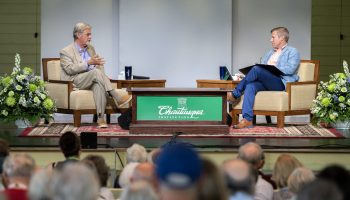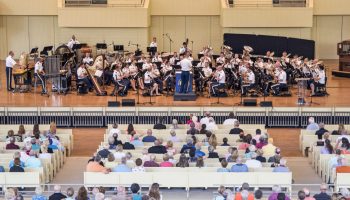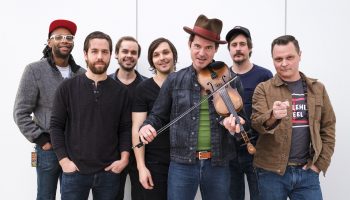“People, loving people of faith, love Scripture, love the Bible,” said the Rev. Robert Allan Hill at the 9:15 a.m. Friday morning worship service in the Amphitheater. His sermon title was “Theological Temptations” and the Scripture reading was Psalm 1.
St. Augustine warned that we use what we love and love what we use. When we make something we love into something we use, we move from faithful confidence to unfaithful certainty.
People love the Solomonic depths of the Bible, the stories with strange names, the tales of Jesus, the honesty about religion in Galatians, the differences between John and the other Gospels.
“We need a note of caution against temptation,” Hill said. “The Bible is errant.”
He said it would be tempting to preach as if the last 200 years of scholarship had not happened. Scholars have shown that Luke’s geography of Palestine is not accurate, that the story of the woman caught in adultery in John is not in the original text and Paul did not write a letter called “3 Corinthians.”
“The passages about slavery in the Bible are as errant and time bound as the passages of Scripture that say women should not speak in church are as errant and time bound as the passages about homosexuality are as errant and time bound as the lists of the 12 disciples,” he said.
The Bible is inspired and inspiring, but it is errant, Hill said.
“If I was going to lead an autumn study group, I might look at biblical scholar Burton H. Throckmorton’s Gospel Parallels,” Hill said.
Founder of Methodism John Wesley loved tradition. Theologian Jaroslav Pelikan said: “Tradition is the living faith of the dead, traditionalism is the dead faith of the living. And, I suppose I should add, it is traditionalism that gives tradition such a bad name.”
Hill said we should receive tradition with happiness, but note that it is always changing, always being and becoming.
“There are those of us who think it is odd that the gifts of ministry are conjoined with celibacy,” he said. “Why are all the gifts of ministry conjoined with just one? Why do we think that all the gifts of ministry are conjoined with heterosexuality?”
He quoted preacher Gardner Taylor: “Who can say to God what God can and can’t do with gifts?”
“If I was going to lead an autumn study group, I would look at Cornell historian Edward Baptist’s The Half Has Never Been Told: Slavery and the Making of American Capitalism,” Hill said.
In addition to Scripture and tradition, people of faith love the way the mind works and use reason to conceive of difference. Hill noted that 34 percent of the American population disbelieve evolution.
He described the timeline in the Museum of Natural History in New York City that follows the evolution of the universe. The universe is almost 14 billion years old, the earth is about 4 billion years old, 500 million years ago multi-celled creatures appeared, 300 million years ago animals appeared, and 100,000 years ago Homo sapiens appeared.
“That is the way we got here,” he said. “We have to use reason to keep our mind centered.”
People love Scripture, tradition, reason and experience, Hill continued. He cited Howard Thurman, one of his predecessors as dean of Marsh Chapel at Boston University, who loved the ocean at night because it was timeless, not affronted by human behavior.
“It is tempting to stop at experience,” Hill said, “but as we go back out of the gates of Chautauqua, we confront the challenge of our own time and place,” where people are asking, “How long, O Lord?”
He told the congregation that they have roles, voices and work to take on.
“Make no mistake,” he said. “In all of Christian history, in all teaching doctrine, there is no place for pre-emptive war.”
Many in the congregation applauded.
“It is not in the just war theory; pre-emptive war is a lateral, imperial, immoral wrong,” Hill said. “You have a voice and a place to bear witness out of the joy of religious experience.”
“If I was going to lead an autumn group study,” he said, “I would pick any of the writings of Andrew Bacevich,” an American historian of international studies and American diplomatic and military history.
Hill said that to love is to take care and be confident, not certain, in the face of theological temptation. He summarized the journey to a common hope by looking backward at the themes of the week. Starting with Friday, the themes were confidence, forgiveness, Spirit, choice, courage and, on Sunday, the vision of common hope.
He recited part of his vision for a common hope:
“We harbor a common dream, a dream that our warming globe, caught in climate change, will be cooled by cooler heads and calmer hearts and careful minds.
“We harbor a common dream, a dream that our dangerous world, armed to the teeth with nuclear proliferation, will find peace through deft leadership toward nuclear détente.
“We harbor a common dream, a dream that our culture, awash in part in hooliganism, will find again the language and the song and the spirit of the better angels of our nature.
“We harbor a common dream, a dream that our families, torn apart by abuse and distrust and anger and jealousy and unkindness, will sit at a long Thanksgiving table this autumn, and share the turkey and pass the potatoes, and slice the pie and, if grudgingly, show kindness and pity to one another and talk turkey.
“We harbor a common dream, finally a dream not of this world, but of this world as a field of formation for another, not just creation but new creation, not just life but eternal life, not just health but salvation, not just heart but soul, not just earth, but heaven.”
He closed by quoting verse four of Charles Wesley’s hymn, “Love Divine, All Loves Excelling”:
“Finish, then, thy new creation; pure and spotless let us be. Let us see thy great salvation perfectly restored in thee; changed from glory into glory, till in heaven we take our place, till we cast our crowns before thee, lost in wonder, love, and praise.”
The Rev. Carmen Perry presided. Mary Ellen Kimble read the Scripture. She is celebrating her 42nd consecutive summer of singing with the Motet Choir. She is now happily retired from her career as a mental health counselor and spends her time now enjoying her grandchildren in England at the holidays, the warmth of Florida in the winter and returning to Chautauqua for the summer. The Motet Choir sang “Consecrated,” by Frank Pesci. Jared Jacobsen, organist and coordinator of worship and sacred music, directed the choir. Gary and Willow Brost provided support for this week’s services.




